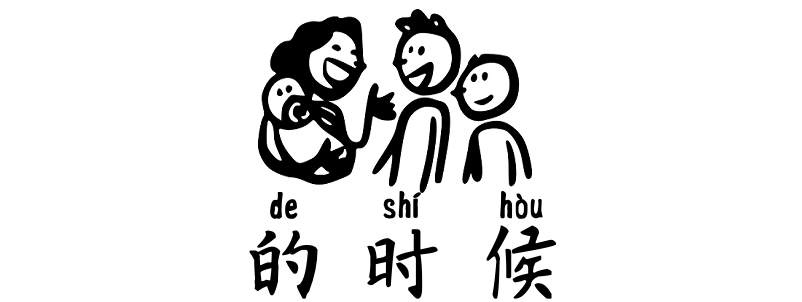Grammar Point:
The time expression grammar “…的时候 shíhou” is similar to the English phrase “when something happens.” It can be used to talk about things that happen at a particular time. To use it, simply attach it to the word or phrase indicating the time.
Sentence structure
Time Word or description + 的時候/的时候
我工作的時候常常喝咖啡我工作的时候常常喝咖啡
I usually drink coffee when I work.
吃飯的時候不要說話吃饭的时候不要说话
Don’t talk when you are eating.
我小(的)時候想當外星人我小(的)时候想当外星人
When I was a child, I wanted to become an alien.
(This is true…)
Description can also be a Stative Verb
你緊張的時候會做什麼?你紧张的时候会做什么?
What do you do when you are nervous?
生氣的時候不要做決定生气的时候不要做决定
Don’t make any decision when you are angry.
難過的時候就哭出來吧难过的时候就哭出来吧
When you feel sad, just cry it out.
Where is the Subject?
Here, you may notice that some of the sentences above have no subject. This is because in Mandarin Chinese, when giving suggestions or commands, it is quite common to omit the subject.
你生氣的時候不要做決定你生气的时候不要做决定
Don’t make any decisions when you are angry.
➡️ 生氣的時候不要做決定生气的时候不要做决定
Don’t make any decisions when you are angry.
妳吃飯的時候不要說話妳吃饭的时候不要说话
Don’t talk when you are eating.
➡️ 吃飯的時候不要說話吃饭的时候不要说话
Don’t talk when you are eating.
Compare with English
In English, you can place the “when” part either at the beginning of the sentence or after the comma, like this:
When you are nervous, what do you do?
What do you do when you are nervous?
But in Chinese, “…的时候 de shíhou” is considered a time word, and is typically used before the subject or directly after it. Therefore:
你緊張的時候會做什麼?你紧张的时候会做什么?O
緊張的時候你會做什麼?紧张的时候你会做什么?O
你會做什麼緊張的時候?你会做什么紧张的时候?X
When it is written or in formal situations
的时候 de shíhou will be shortened to simply 时 shí
開會的時候不要聊天开会的时候不要聊天
Don’t chat when you are in the meeting.
➡️ 開會時不要聊天开会时不要聊天
Don’t chat when you are in the meeting.
去年太太生日時我做了個蛋糕去年太太生日时我做了个蛋糕
I made a cake when it was my wife’s birthday last year.
- Use 当 dāng to express “when” (HSK 2)


